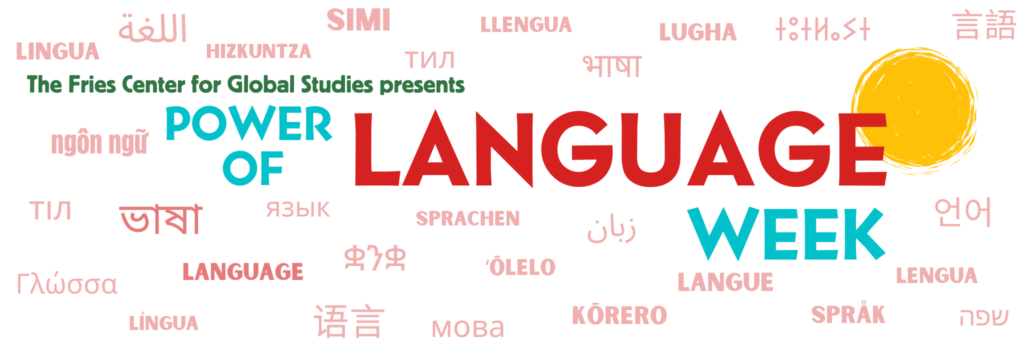
Context:
For this assignment in 305, we were tasked with attending two Power of Language week events, happening from February 13-23. During these events we took “fieldnotes” marking down what we found interesting or enlightening. We then wrote up a description, like this one, below, looking out for “how the event organizers and participants talk about and use language.” And what was “interesting or distinctive about their approach or language practice.”
Tea and Samosas with ISAB! Learn about International Mother Language Day! Feb. 20, 5-6PM
This event was an informal gathering in the Fries Center about International Mother Language Day and the Bengali language movement. When I first arrived, there were a gaggle of students sitting around each other and also an older gentleman. I sat off to the side to drop my bag and also because there wasn’t an easy place to find a seat. I noticed the students and recognized that I was the only white student there. I guess this momentary feeling out of place was natural, because I soon realized the event was with ISAB, the international student advisory board. I moved over to the group of students and introduced myself. I spoke briefly with Tina, from Ethiopia, and who is pursuing economics. I think she asked if I was an international student, and I said that I wasn’t, but have been studying Chinese and am a part of the global engagement minor. Although everyone else was international students I tried to break the ice with receptivity, listening to their stories. I told Tina that my high school friend was ethnically Eritrean and had spent some time there. I asked if she’d ever been, because I knew the countries had history but was mostly ignorant. She said that she hadn’t but explained some of their history. I also learned that the first time she ever traveled was to come to the U.S. for college. I exclaimed something like “wow” to this which I soon after realized was a kind of lapse in recognizing my privilege.
As a group we spent a little more time in small talk about several topics. We spoke about upcoming language week events and I also heard from Tirina, a student from Mongolia, about her experiences with poor air quality there, and how it is a common phenomenon. I learned that she’s also pursuing the GEM minor. Our conversation was briefly interrupted with a little presentation about the Bengali language movement. A Bengali student explained the meaning of the day, Feb. 21st, as a landmark day in which students protested for the recognition of Bengali as the official language of East Bengal- (modern-day Bangladesh) then a Dominion of Pakistan. She explained that the protest song Ekushey Gaan aka “My Brothers’ Blood Spattered” was an influential song in bolstering the movement. As a student from Bengal the movement and day was one both of grieving but also a sense of pride. She played the song and several other Bengali songs throughout the event.
There was chai tea and samosas, so we snacked on that while we made small talk for the rest of the event. I spoke primarily with Tirina and learned a lot about herself and Mongolian culture. We also found some interesting connections between the two of us. We spoke a little bit about language. I asked if Mongolian was the primary language and if any others are spoken in the country. She brought up how there is a Kazakh region in Mongolia where Kazakh is primarily spoken. However, a lot of young people know English, because it is taught in school. She remarked that when she was younger it was more “special” to know English but that it’s more common nowadays. I found this generational shift interesting. She also explained how she has no last name, in Mongolia children take their fathers first name as their “last name.” I put this is quotes because the last name is more like a surname which goes ahead of their first name. I remarked on the seeming patriarchal aspects of this and she explained that this gender inequality is a common feature in Mongolia. This led to a conversation about my German citizenship which I originally did not have due to a lineage requirement. It had to go through my grandfather’s side eventhough my grandmother was German. This requirement was later changed, so I had to go through the process to become a German citizen. Trinia also knew some German, so we spoke about this, and she described how she wants to study abroad in Germany. We had a productive discussion about aspects of study abroad.
I think the most interesting part of the conversation came at the end when we spoke about Mongolian history. She was going to lead an event on the Secret History of the Mongols, the definite piece of literature on Mongolian history. However, she explained that growing up there was a nationalist message was tied to the history. And in the U.S., she’s seen Mongolians commonly portrayed as barbaric and vicious. As she’s grown up, however, she’s seen through these two stereotypes. She sees more nuance, and specifically, the role and history of women in Mongolia, which was also erased from the Secret History. I learned a little about this from my Foundations of East Asia class and described my limited knowledge and asked more questions about it. I think I came away from this conversation with Tirina recognizing a shared interest in history and also how we inhabit these histories and lineages while at the same time being conduits of change.

Leave a Reply